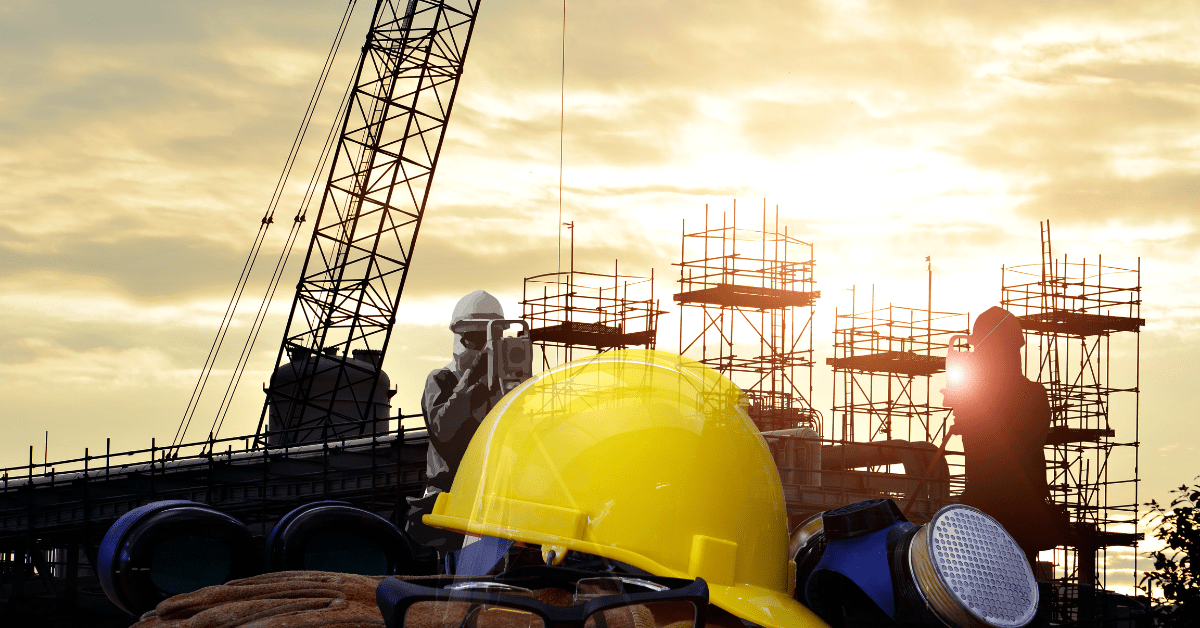World Day for Safety and Health – Safe Workplace in a Changing Climate

Climate change is happening faster than predicted, and its effects are increasingly impacting our day-to-day lives. From frequent storms to unprecedented heatwaves, we are all becoming more aware of the risks that global warming can cause.
While unpredictable weather events are well-documented and understood, one element of climate change that needs to be spoken about is its detrimental impact on the global workforce, which is what World Day for Safety and Health at Work is all about!

What is Safety and Health at Work Day?
Safety and Health at Work Day, or World Day for Safety and Health at Work, is an annual event celebrated on April 28th. It’s a day to promote safe, healthy and sustainable workplaces by raising awareness about occupational health and safety issues.
The initiative was launched by the International Labour Organization (ILO) in 2003, and each year focuses on a different theme to help reduce the number of work-related deaths and injuries that happen at work.
What is the theme of World Day for Safety and Health at Work Day 2024?
The theme and focus point of 2024’s event is the impacts of climate change on occupational safety and health. The ILO is launching a data-rich report on the topic and hosting global events with experts and guest speakers from governments and businesses to discuss how to protect workers and respond to this global challenge.


The impact of climate change on the world of work
There are certain environments and industries where workers are particularly at risk; these include:
- Outdoor workers in physically demanding sectors, such as agriculture, construction and transportation.
- Indoor workers in hot and poorly ventilated environments.
- Workers in emergency services, the health care sector and other public services.
- Pregnant women, older adults and persons with disabilities.
- Workers in the informal economy, migrants and those in micro- and small-sized enterprises.
Key issues impacting workers’ health and safety
Climate change poses several key issues that impact workers’ health and safety, including:
Excessive heat
Rising global temperatures lead to more frequent and intense heatwaves, increasing the risk of heat-related illnesses such as heatstroke and dehydration for outdoor workers.
Who’s at risk?
Agriculture, construction and outdoor manufacturing due to prolonged exposure to sun and physical exertion.


Solar UV radiations
Thinning of the ozone layer is impacting the quantity of solar UV radiation reaching Earth, which can cause sunburn, eye damage, weakened immunity and various skin cancers in workers.
Who’s at risk?
Agriculture, construction and outdoor manufacturing due to prolonged exposure to sun and physical exertion.
Extreme weather events
More frequent and severe extreme weather events like hurricanes, floods and wildfires pose direct risks to workers’ safety, causing injuries, displacement and psychological distress.
Who’s at risk?
Emergency workers, workers involved in clean-up, agriculture workers and fishing workers.


Workplace air pollution
Climate change exacerbates air pollution, which can have health impacts including cancer (lung), stroke, respiratory disease, cardiovascular disease and eye irritation.
Who’s at risk?
All workers, particularly outdoor workers, transport workers and firefighters.
Vector-borne diseases
Changes in temperature and precipitation patterns can expand the geographic range of vector-borne diseases such as malaria, lyme disease, dengue, schistosomiasis, leishmaniasis, Chagas disease and African trypanosomiasis.
Who’s at risk?
Outdoor workers.


Agrochemicals
Pesticide use can be impacted by climate change and cause health problems such as poisoning, cancer, neurotoxicity, endocrine disruption, reproductive disorders, cardiovascular disease, chronic obstructive pulmonary disease, endocrine disruption and immune suppression.
Who’s at risk?
Agriculture, forestry, chemical industries, pesticide sales, greenspace and vector control.
Mental health challenges
In addition to the physical health concerns mentioned, many workers face heightened susceptibility to mental health challenges induced by climate change.
Specific occupations like those in disaster relief and recovery, construction, agriculture and healthcare have been found to be particularly at risk for PTSD, depression and anxiety. Additionally, certain climate change impacts, such as excessive heat, can lead to sleeping disorders, behavioural changes and decreased concentration, impacting work safety and productivity and exacerbating mental health concerns.

What you can do to protect your workforce
Health surveillance is designed to proactively monitor and safeguard the health of your employees, ensuring compliance with regulatory requirements and identifying any workplace hazards that might affect the health of your employees.
With our broad, cross-industry experience and clinical specialists on hand to offer expert guidance, we’ll help you minimise workplace risks so you can be confident that your employees will stay protected, safe and well.
Vaccination and Immunisation services
Tailored to meet the unique needs of your workforce, our expert team collaborates closely with you to ensure that your employees receive the necessary vaccinations to safeguard their health and wellbeing in the workplace and beyond.
From assessing vaccination requirements based on job roles and travel destinations, to administering vaccines on-site or at designated healthcare facilities, you can rest assured that your workforce is protected against vaccine-preventable diseases, promoting a healthy work environment and ensuring business continuity.
Specialist Medical Assessments
Specialist medical assessments ensure that you are fulfilling your duty of care obligations, complying with health and safety legislation and that your employees in safety-critical roles are fully fit to perform their duties. Our experienced physicians are fully trained and qualified in the following areas of industry expertise:
- Offshore
- Transportation
- Logistics
- Asbestos
- Ionising radiation
If you want to keep your workers safe and well and ensure that climate change doesn’t impact their health, our friendly team is here to guide you. Get in touch to find out how we can help.
The Latest from our Blog…
Check out our blog for all of the latest news, events and updates from Medigold Health.
-

Why self-identification matters in neurodiversity
What’s behind the rise in ADHD diagnoses? Is it social media, increased awareness – or something else entirely? And how does self-identification fit into all of this? Our Lead Disability Training and Consultancy Specialist, Kath Wood, shares her expert insights on why more people are recognising themselves as neurodivergent, what[...]
Read More -

World Health Day 2025: Why your business needs to be supporting working Mums
Every year on 7th April, World Health Day gives us a chance to pause and reflect on the most pressing health issues facing people around the globe. This year’s theme – Healthy Beginnings, Hopeful Futures – puts the spotlight on maternal and newborn health, with the World Health Organisation calling[...]
Read More -

Is your workplace stressed out? Discover our top strategies for a healthier, happier workplace
April is Stress Awareness Month, and we’re taking this opportunity to spotlight the impact of stress in the workplace and its effects on employees’ mental wellbeing! We’ll also share practical strategies to help create a stress-free environment, ensuring your team feels supported and empowered to thrive. The impact of[...]
Read More





